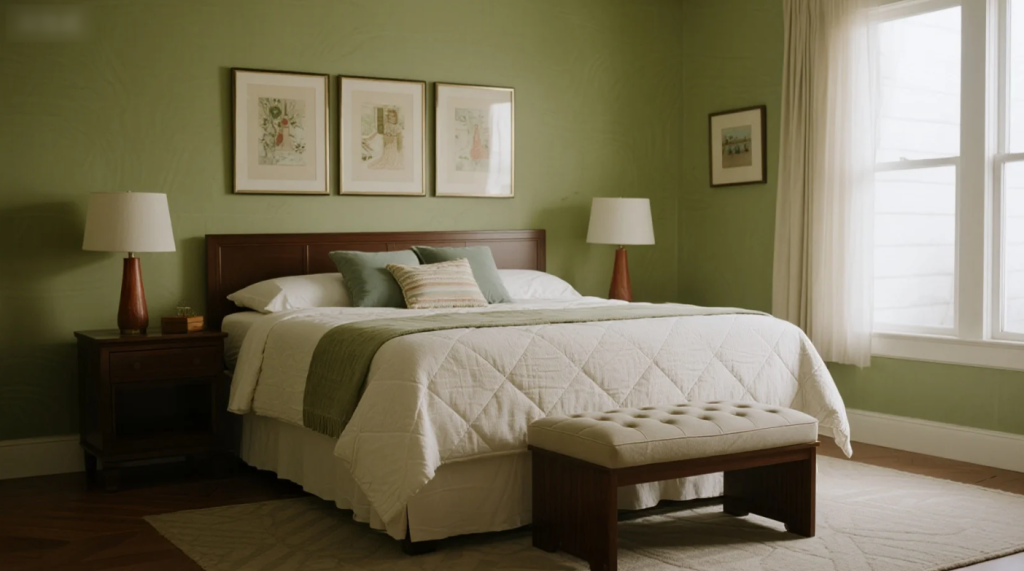Feng Shui is more than a home decor philosophy — it’s a holistic approach to creating environments that nurture well-being, vitality, and flow. While many Feng Shui principles focus on how to enhance your space, some rules are meant to protect you from energetic harm — and one of the most important is avoiding the so-called bedroom “death position.”

Whether you’re familiar with Feng Shui or just exploring energy-aligned design, understanding this principle can help you create a more restful and harmonious bedroom. We asked top Feng Shui experts to explain exactly what the death position is, why it matters, and what you can do if your current bedroom layout falls into this common trap.
What Is the Feng Shui Death Position?
The “death position” refers to a bed placement where your feet point directly toward the door — a setup many Feng Shui experts strongly advise against.
“This configuration is considered deeply inauspicious,” says Feng Shui master Marie Diamond. “In many cultures, bodies are traditionally carried out of a room feet-first. So in Feng Shui, this layout is seen as symbolizing death, loss of energy, and vulnerability.”
Also known as the “coffin position,” this bed alignment is thought to create an energetic pathway that pulls your qi (life force) out of the room, leaving you feeling drained or restless. Feng Shui consultant Anjie Cho, co-founder of the Mindful Design Feng Shui School, agrees. “It’s not just superstition — it’s about how energy moves through space. When your feet face the door, you’re positioned directly in the path of fast-moving energy, which can disrupt your rest.”
What’s the Best Bed Placement for Good Feng Shui?
According to experts, the ideal solution is to position your bed in a commanding position — a core concept in Feng Shui bedroom design. This means your bed should face the door indirectly, not head-on.
“You should be able to see the door while lying in bed, but not be directly aligned with it,” explains Cho. “A diagonal placement, where the bed is positioned across from the door but offset, creates a sense of safety and control.”
This positioning helps you feel secure while resting, improves the flow of supportive energy, and allows your nervous system to relax — all critical components of restorative sleep and balanced living.
What If You Can’t Avoid the Death Position?
In some rooms, avoiding the death position may be challenging due to fixed layouts or limited space. The good news? Feng Shui offers several practical remedies to counteract the negative effects of this alignment.
Here are three expert-recommended solutions from Marie Diamond:
1. Add a Barrier Between the Bed and the Door
Placing a bench, low table, screen, or even a plant at the foot of the bed can symbolically block the direct energy path from the door. This creates a buffer that slows and softens the incoming qi.
2. Use a Footboard for Protection
If your bed doesn’t already have one, consider adding a footboard. It acts as a physical and energetic boundary, shielding you from the fast-moving current of energy entering through the doorway.
3. Ground the Energy With a Rug
A soft, plush rug between the bed and the door can help absorb disruptive energy. “This grounds the space and calms the energy that might otherwise rush toward the bed,” explains Marie.
Even small changes like these can dramatically shift how your room feels — promoting deeper rest, emotional safety, and energetic protection.
Beyond Bed Placement: Other Feng Shui Considerations
If you’re looking to further optimize your bedroom for good Feng Shui, consider these complementary adjustments:
- Incorporate plants (like peace lilies or lucky bamboo) to revitalize energy
- Use natural textures to create a calming environment
- Introduce a folding screen to redirect or slow down sharp energy paths
- Add warm lighting and soft curves to create yin (passive, relaxing) energy
Feng Shui isn’t rigid — it’s adaptable. What matters most is your intention and how the space makes you feel.
“The bedroom should support peace, rejuvenation, and love,” says Diamond. “When you align your bed and surroundings with Feng Shui principles, you invite those qualities into your life.”
FAQs
Why Shouldn’t Your Bed Face a Mirror?
According to Marie Diamond, having your bed directly facing a mirror is considered bad Feng Shui because mirrors reflect — and amplify — energy.
“Mirrors are extremely active,” she explains. “If they reflect your bed, they can disturb your sleep, create a sense of being watched, and even double the presence of stress or unresolved emotional issues.”
If you can’t move the mirror, cover it at night with a curtain or cloth to soften its impact and help promote a more restful atmosphere.
Final Thoughts: Why This Feng Shui Fix Matters
Avoiding the Feng Shui death position isn’t just about tradition — it’s about creating a space that supports your body, mind, and energy while you sleep.
With just a few thoughtful shifts — either repositioning your bed or using strategic remedies — you can create a room that feels calmer, safer, and more energetically balanced. Whether you’re a Feng Shui enthusiast or simply want better sleep, this principle is worth paying attention to.
